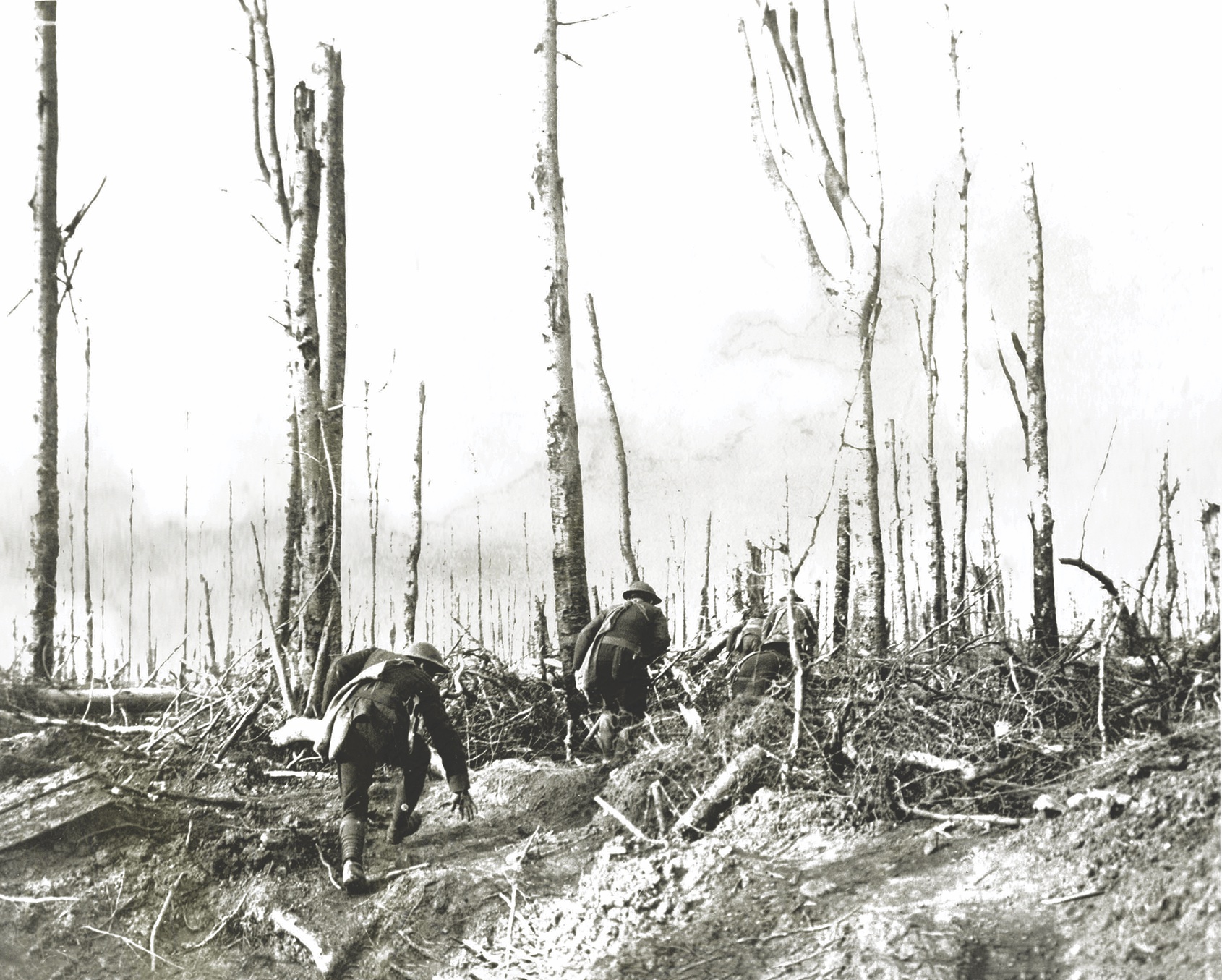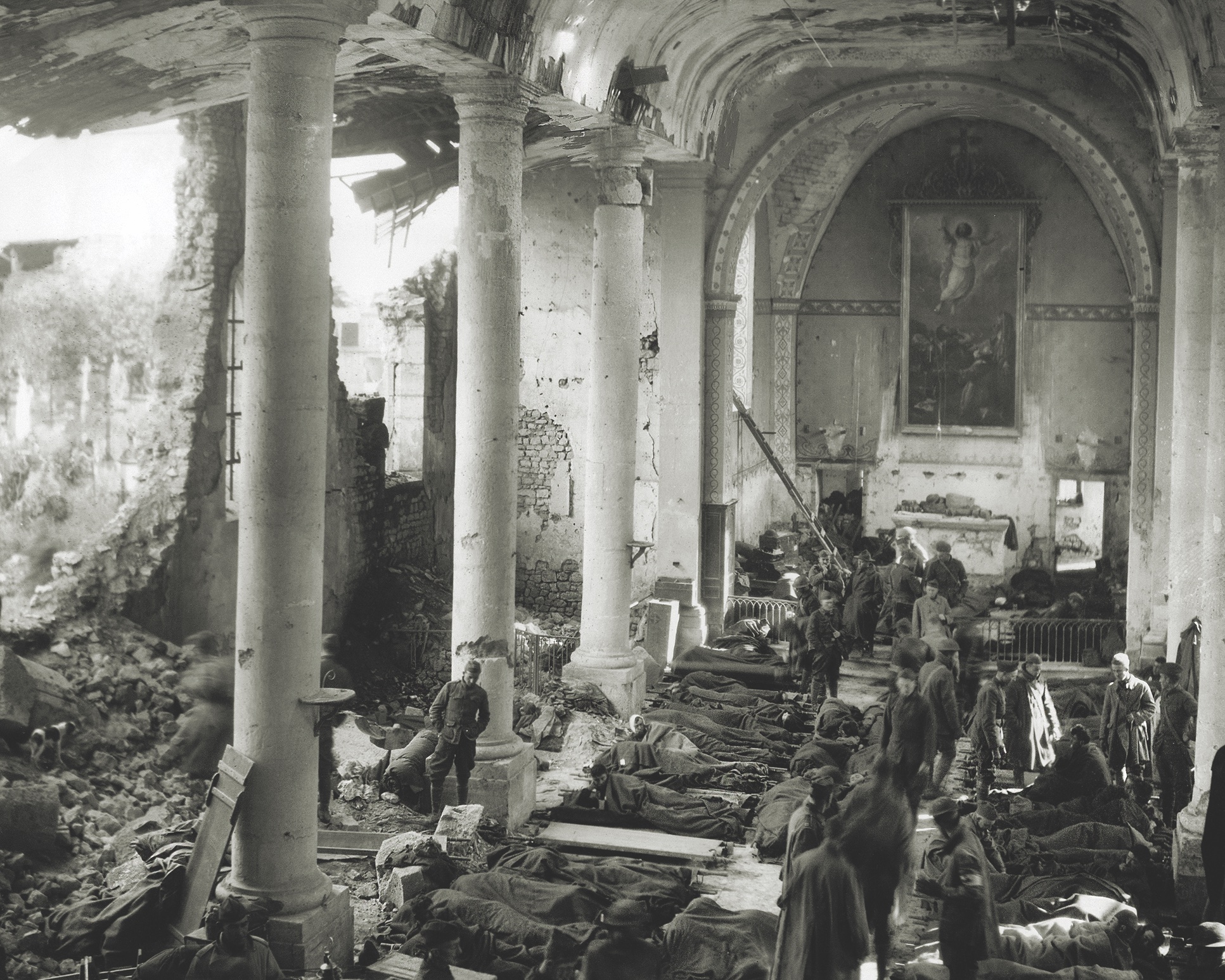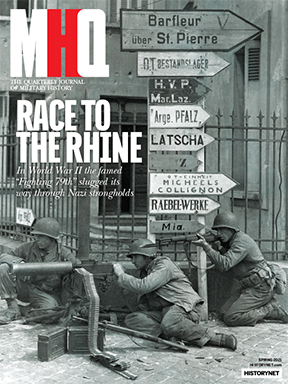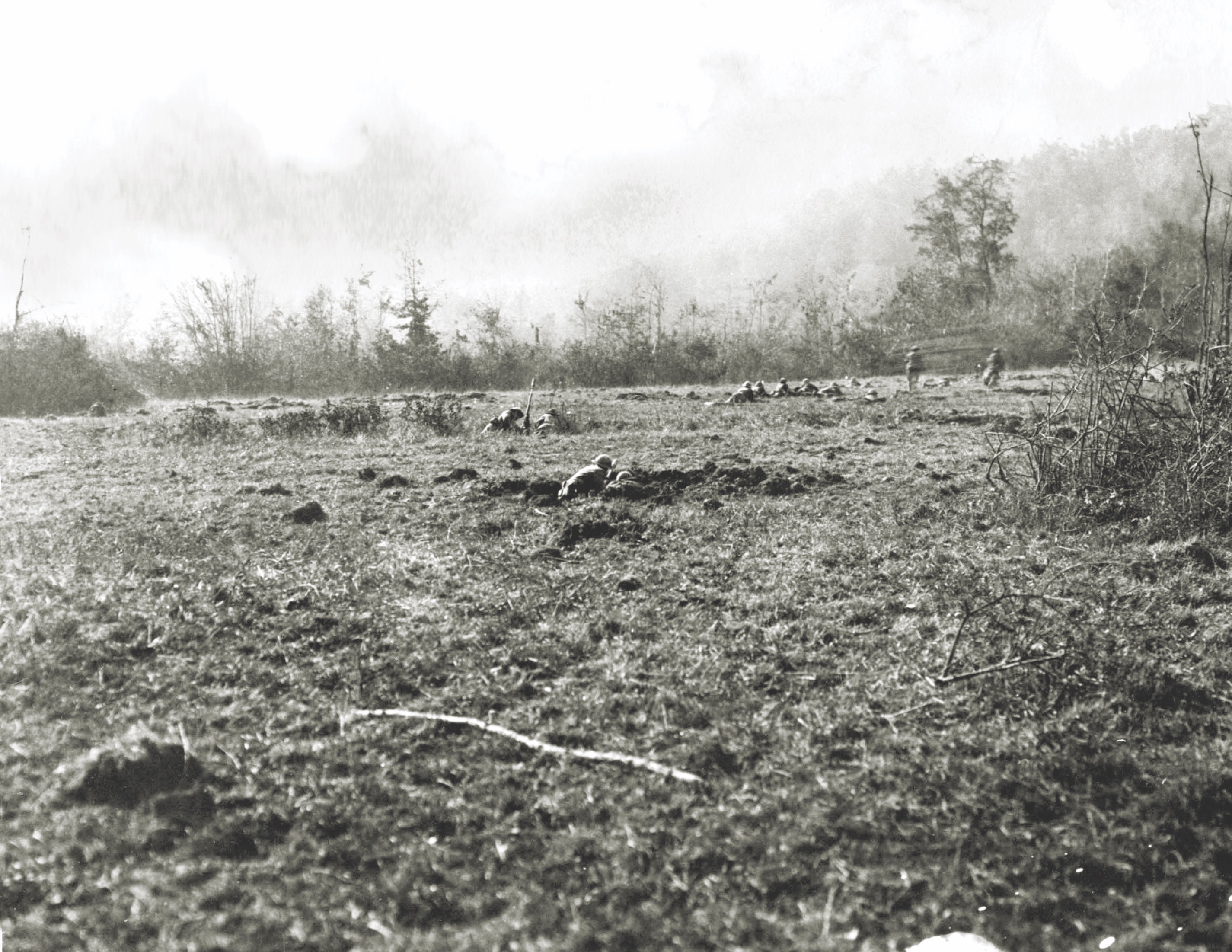In 1918 Arthur M. Schlesinger, a young history professor at the Ohio State University, was appointed the chairman of the Historical Commission of Ohio, which Governor James M. Cox had created to collect and preserve a wide variety of records relating to the state’s role in World War I. For much of the next two years, Schlesinger, with the help of a colleague on the Ohio State faculty, sent letters to former students serving overseas with the American Expeditionary Forces, asking them to relate their experiences in the war. One of Schlesinger’s correspondents in this effort was Private E. Allen Pastelnick, then in France with the 140th Ambulance Company of the 110th Sanitary Train.
Pastelnick, who was born in Russia in 1895, had grown up in St. Louis and attended the University of Missouri before making his way to Ohio State in 1914. He registered for the draft in St. Louis in 1917, noting that he had served three years in the Missouri National Guard but was currently a student. To help pay his way through college, every night at around 9 p.m. Pastelnick loaded two big baskets with homemade sandwiches, pies, and cakes and began making the rounds of the fraternities on campus. His average profit: about $12 a week—enough, he told a reporter, “to go through school comfortably.”
In a typewritten letter to Schlesinger, reprinted here in lightly edited form, Pastelnick describes the “nightmare” of being in the Meuse-Argonne Offensive, a major part of the final Allied offensive of the war and the second deadliest battle in U.S. history. “This is one dream,” he told Schlesinger, “that I will ever remember.” Pastelnick used underscores instead of place names in his letters, as U.S. Army censors would have cut them out had he not.
Pastelnick survived the war, was married in St. Louis in 1921, and embarked on a career as a real estate developer in the western suburb of Kirkwood. He changed his last name to Pastel sometime in the 1920s, and in 1950 he and his family moved to New York, where he later became active in Democratic Party politics. He died in 1970 at age 76.
After active service,
Oct. 3, 1918.
Prof. A. M. Schlesinger:
Received your letter while I was going thru what you mention in your letter as a “bad dream.” Truly it has been a nightmare, and thank God I am thru with it and still able to write you. Today is the third day since we were relieved, but the incidents of the battle will be no less vivid on the third year than they are now or than they were three days ago. This is one dream that I will ever remember. The preparations for the battle were made in the week preceding Sept. 25, and on that night we poured a continuous stream of shells into the German lines. At that time we were still behind the lines awaiting orders. On the 26th of Sept. our “doughboys” (among whom were many of my former associates and friends) went over the top. What these boys did, I was able to see the next day when we were ordered forward to establish a dressing station. The infantry had pushed Jerry about six kilometers to the north of this town, where we were ordered to only that morning. We got on trucks about 9:00 A.M., although we were awakened at 4:00 A.M. that morning. The trip was most uneventful except that we were going over the battlefield of the previous day. The road had been filled up and put in good shape immediately after we pushed Jerry away, and the cars made good time until we reached _____, where a bridge had been blown up and a board road had been built around the bridge and over a shallow part of the water. Later we came across several such temporary roads which went around deep shell holes. All along the road there [was] plenty evidence of what had happened on the 26th of September. By the time we reached _____, we had quit shuddering at the ghastly sight of the dead and the wounded. Every American soldier seen dead on that road was in a position facing the enemy. This was not true of the German soldiers. At _____ there lay an American doughboy and a Jerry facing each other. They had found each other’s Achilles’ heel. The American lad had his hand over his heart. I did not take any particular notice of the dead Jerry.

Before reaching _____, we had to pass over a hill in plain view of the enemy. When we reached the top of that hill, the enemy guns started shelling us. Two fellows were sitting on the side of the truck on each side of me when the first shell exploded about twenty feet from us. We all fell to the bottom of the truck both because of the concussion and thru instinct. I saw the cloud of dirt uprooted by the explosion, and I saw three wounded men fall to the ground. Then on lifting my head I saw one of these men crawl to a shell hole. Just then another shell exploded and we all scrambled off the trucks and ran from the road to neighboring dugouts—all except the drivers, who drove the cars off the crest of the hill, then joined us. When the bombardment was over, we went back to the cars.
When we got to _____ it was crowded with artillery ammunition caissons, wounded, and Red Cross workers. We unloaded the trucks in a hurry, and in one instant a group of detail-dodging men were metamorphosed into the hardest, most uncomplaining, most self-sacrificing group of men I have ever seen.
I saw a wounded man who had gone to the officers training school with me. This man had been shot in the left hand. Somebody had put a first aid bandage over it and sent him back. He took a gassed man with him, looking after the gassed man better than he did for himself. After exchanging greetings, I asked him what I could do for him. He asked me for a new gas mask, as a bullet had ruined the [canister] of his own mask. After I gave him the new mask, he turned the gas patient over to me and refused further medical attention because of the large number of more serious cases that were congesting the dressing station. Then began the real work. We sent the litter men forward and started working on the patients who had walked in. We worked the rest of that day without resting a single minute for any purpose whatever. Altho we had eaten nothing all day, we took time to drink a cup of cocoa now and then—otherwise the wounded needed all our time and we gave it to them. On one occasion, one of the litter bearers brought me a cup of bouillon and two slices of bread and butter. I saw three patients who were able to eat. One slice went to each one of the patients and the soup to the third one. Then I went back to my grim work. About 10:00 P.M. the patients quit coming in, as it was too dark for the litter bearers to find them, and all those able to walk in had come in by that time. We then drank some cocoa and grabbed a few moments’ sleep under the most adverse conditions imaginable. Our dressing station consisted of two cellar rooms that had been covered with a thick layer of earth. The rooms were about 16 ft. square, and there was only the door thru which light could come in. These rooms were part of what used to be a home. About a hundred feet from us, two batteries of artillery spat fire all day and most of the night. Thru these two rooms, and thru two similar dressing stations on each side of us, passed all the wounded in our division. We worked incessantly that day until about 10:00 P.M. when we huddled together and tried to get some sleep. Before we called it quits for the day we fixed everything so that on the morrow we would be in good shape to resume our gory task. These two rooms presented a grim appearance that night. In one corner were all the bloodied bandages that we had removed during the day. In the opposite corner were a couple of medicine trunks with pile after pile of gauze and muslin bandages on them—ready to do their bit on the following day. In another corner was a pile of blankets over which three shell shock patients hovered. The rest of the floor space of the front room was covered with tired humanity.
All over the floors of both of the rooms—true democracy was in evidence. The same was true in doing our work. A Lieut would take orders from a private just as easily as he was wont to give them before. The one ruling desire was to dress the wounds to our best ability and to get them back as soon as possible. All other considerations were put away for the time being anyway. In talking about our work there we always give credit to the other boys, although everybody could easily claim the credit for themselves.
At the very first break of day we all got up, and the day’s activities began. I went out with a litter squad, not desiring to wait until the patients were brought in, when some of the boys had laid in some wet shell hole all night suffering untold agonies. The artillery was putting on a heavy barrage fire when we went on the field. Under this barrage fire we picked up our patients and returned to the dressing station. It was still that dark that we had to use lanterns in doing our work. Every time the battery in back fired a volley, our lights would go out, and the shock patients would wish that they were out of their misery altogether. Well, the same story of the day before was true on this day. A lot of work under a lot of difficulties performed in a most self-sacrificing way by everybody. The day before presented a hard problem for the evacuation officers, but this day saw a solution of this problem and the speedy evacuation of the patients. During the previous day three patients had died while waiting for evacuation, and one man had died in the dressing station before we could work on him. This man had been given a lot of morphine to relieve his pain. Then we tried to warm him up so that we could work on him, but he expired on the “shock table,” his last words being “Hello Bill.” At least he was happy when he died. One of the features of the day’s activities was the verification of the stories that the Germans did not respect the Red Cross insignia. On one occasion our ambulances—on the field—were shot at by a German aviator, two mules being killed. Later a German aviator pumped a stream of machine gun bullets into a trench where the boys had gathered a lot of the wounded. “The unspeakable Hun” has to answer many a similar indictment.

Now to resume the narration of the events of Sept. 29th. The division had suffered heavy losses and was pretty much played out—everybody was praying for relief—when the Dutchman let loose his counterattack. It came suddenly and was strong. For a time it seemed to succeed, but history will tell that we repulsed it and gained some additional territory doing it. The engineers had been brought up the night before to dig a line of trenches for the boys to hold onto until relieved. They dug these trenches under fire [and] then retired. About noon of the 29th, the story that our boys were retreating began to circulate. This was due to the fact that the infantry had retired to the line of trenches just dug for them. We kept on working unconcernedly, confident of the ability of our boys to hold the line. Then, about 3:00 A.M., the order came for us to evacuate the dressing station. The other ambulance companies left before we did, so that when we did leave, it seemed that we were too late.
The division had retired to a place close to where our dressing [station] was, and the enemy was pressing their strong attack. At this junction of the day’s events, many of us went thru a transformation of opinion on many subjects. Personally, here is what happened to my notions conceived thru previous pictures. In the first place I had come to the conclusion that the old time battle scene where the commanding officer stands with his arms folded, calmly ordering the men, was an impossibility in trench warfare. Major [Norman B.] Comfort, a St. Louis acquaintance of mine, changed this conclusion. As our company was going back, I saw him standing in that picturesque pose telling the infantry what to do, stopping anybody who had no orders to go back, commanding machine guns—in fact, he seemed to be directing the whole battle. All this was done very calmly and deliberately, altogether unmindly of the shrapnel that was bursting all around him. The battle scene itself was much like what I had imagined as taking place in 1862. In back of me the American artillery was spitting fire as fast as the men could feed the guns. On both sides there was “doughboys” operating their guns under their officers’ orders. Machine guns were put-put-putting their shells at Jerry on both sides. Then in front of me—I knew that Jerry was coming. We were given the orders to move back, and we packed hastily and started what we now laughingly term “our strategic retreat.” It was no laughing matter at that time, as shrapnel and gas shells were bursting all around us, as Jerry was putting over a barrage. I took my time at the beginning, harboring my strength for the top of the hill where I intended to make a dash until I was over the crest. I had thrown my pack away as excess baggage.
Just before I reached the top of the hill, the gas alarm was given. I put on my mask, but after stumbling over some wire and running into a mule I pulled the mask from my face, deciding to run thru the gassed area. I got a couple of whiffs of the gas—which was mustard gas, but it did not hurt me. When I reached the top of the hill, I started running but had run only a few yards when I heard a shell coming from one of Jerry’s guns. I jumped behind a tree and dropped to my stomach just as the shell exploded within a radius of thirty feet. This shell was gas, and all it did was to throw a lot of dirt on me and cause me to put the mask on and move. This time I got my breath under the tree before resuming the “strategic retreat.” Before I started again, the shelling had become pretty intense, so I hesitated a little longer than I had intended, hating to leave the seeming shelter of the tree. Finally I got up and ran over the longest crest I have ever been on—shrapnel falling all around. Two of our men were hit by shrapnel on this crest.
That night the division was relieved, and the new men coming in on both sides cut off a whole lot of Jerrys and captured them. It really had been a contemplated strategic retreat. We then pushed Jerry four kilos further back than he had been before his counter attack.
We camped in a field until the next morning. Tho it rained all night and I had no blankets, I slept soundly, not waking until 8:00 A.M. next morning.
We have received the news of our victories all along the line and of Bulgaria’s capitulation—you have rejoiced at the same news. Undoubtedly you have also rejoiced at the news [of the] victory of the American boys west of Verdun. What I have just written is about that victory. It was a “bad dream,” but those who wake up from it have come out far for the better for having gone thru the crucible [of] self-sacrifice, loss of all petty jealousies, a greater confidence in all people regardless of race, color or religion—all except the Hun. How we did pray for the colored boys to come to relieve us. How we smiled at them and encouraged them as they passed us on the road! How we decided that “Froggies” had pep when we saw them bringing their tanks and their “75’s” at the double time. How some of our boys took off their brassards and joined “a lower” branch of the service, deciding that the doughboys were the highest branch of service.
All that will never be told in press reports of the American victory west of Verdun. Many reports in the papers have been proven true in our experiences here. Yes, the doughboy smiles over his wounds and says, “I want to get well so that I can get another wallop of the [dirty] _____.” You can believe that now. After seeing what I have seen and hearing what I have heard, I believe with most of our brave doughboys that we should take no more prisoners and that we should devastate a German city for each French, Belgian, or Serbian city they have ruined. No, it is not the Kaiser that has brought this world to this great war. It is the Prussian people. The men opposed to us were Prussian Guards, and I am firmly convinced that they are altogether in sympathy with the Kaiser’s ambition. I absolve the smaller German states as I think they have really been forced into it.
The last part of this letter was written after I came back from the funeral ceremony of one of my comrades, who died on the field, hit by that awful stuff—shrapnel. Do not feel like writing dispassionately at the present so will close with my sincere regards. Luck to your work of preserving records of this war for Ohio. MHQ
[hr]
This article appears in the Spring 2021 issue (Vol. 33, No. 3) of MHQ—The Quarterly Journal of Military History with the headline: Experience | Nightmare on the Western Front

Want to have the lavishly illustrated, premium-quality print edition of MHQ delivered directly to you four times a year? Subscribe now at special savings!





